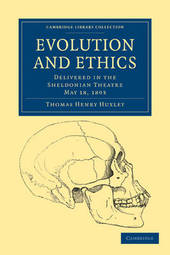
|
Evolution and Ethics: Delivered in the Sheldonian Theatre, May 18, 1893
Paperback / softback
Main Details
| Title |
Evolution and Ethics: Delivered in the Sheldonian Theatre, May 18, 1893
|
| Authors and Contributors |
By (author) Thomas Henry Huxley
|
| Series | Cambridge Library Collection - Philosophy |
|---|
| Physical Properties |
| Format:Paperback / softback | | Pages:68 | | Dimensions(mm): Height 229,Width 152 |
|
| ISBN/Barcode |
9781108004558
|
| Classifications | Dewey:171.7 |
|---|
| Audience | | Professional & Vocational | |
|---|
| Illustrations |
Worked examples or Exercises
|
|
Publishing Details |
| Publisher |
Cambridge University Press
|
| Imprint |
Cambridge University Press
|
| Publication Date |
24 September 2009 |
| Publication Country |
United Kingdom
|
Description
In 1893, the biologist and educator Thomas Henry Huxley (1825-95) published the text of a public lecture on ethics and evolutionary theory. He opens Evolution and Ethics with the story of Jack and the Bean Stalk as a metaphor for cyclical evolution-the small seed that becomes a mature plant. Huxley then takes the reader on a journey through two culturally different belief systems Buddhism and Greek intellectual thought - to illustrate human attempts to understand the 'cosmic process'. Huxley outlines the growth of differing concepts of justice as populations became more organised, and how different societies dealt with the knowledge that nature is unjust. Huxley abhors the harsh applications of Darwin's work to society and decries the 'gladiatorial theory of existence'. Arguing against the concept of social Darwinism, Huxley proposes that ethical behaviour must counteract the painful effects of the 'struggle for survival' in order for society to progress.
ReviewsPraise for Princeton's previous edition: "Describing the struggle for existence in nature, Darwin tells us that 'we may console ourselves with the full belief . . . that the vigorous, the healthy, and the happy survive and multiply.' Thomas Henry Huxley presents a more pessimistic interpretation. -- Allan Larson "TREE" Praise for Princeton's previous edition: "For Huxley, natural selection is not to be deemed a mixed blessing; rather, it is a damnable mix. -- Arthur Falk "Humanist" Praise for Princeton's previous edition: "Reading Huxley's text again is a pleasure and a double reminder . . . that we're no closer than the Victorians to a comfortable understanding of our place in nature . . . that Huxley . . . could contextualize [his] thinking . . . with respect to a vast array of cultural and intellectual traditions [he] knew and respected. Few today could do that as Huxley does. -- Archie Mancato "Nineteenth-Century Contexts"
|